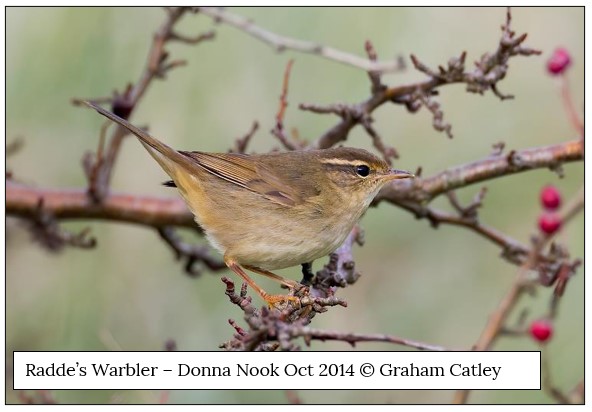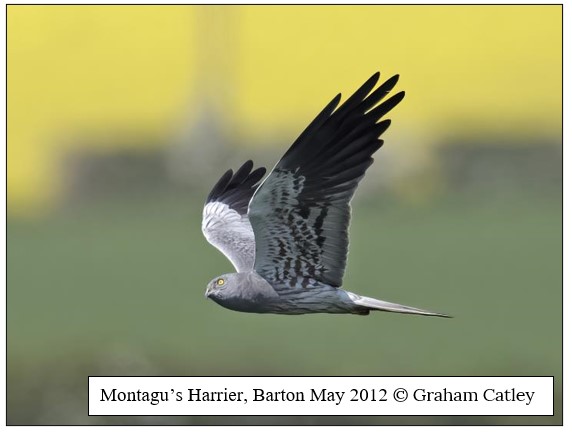Whenever I see a new bird in Lincolnshire I always go home and look it up in the excellent Birds of Lincolnshire. Seeing the delightful Radde’s Warbler at Walla Bank in October was no exception, so I was interested to read that it was first identified by Gustav Radde in 1856 and it was named after him. And that’s as it should be, the shared name gives the man and the bird a certain dignity.

Which brings me to Jims Wright’s post (forum, 3rd. November) drawing attention to the 80 name changes the American Ornithological Society are considering. As Jim points out, most of the changes will be birds named after people. I was initially outraged, naively thinking that birds were named after the finder, as above, but apparently this was not always the case, and I am now beginning to see another side of the debate.
Gilbert White famously separated Chiffchaff, Wood Warbler and Willow Warbler in1780. The Chiffchaff named itself, the Wood Warbler lives in woods, but the Willow Warbler, which has no particular preference for willow, in my view should have been named White’s Warbler. Instead, rather incongruously, Dr. John Latham, who first described the White’s Thrush in 1790, named that in honour of Gilbert White, a bird I suspect White never saw.
George Montagu modestly named his harrier ‘Ash Coloured Falcon’ which was later renamed Montagu’s Harrier by Yarrell in 1843. That seems fair enough, but what about Bewick’s Swan? This was shown to be a separate species by Yarrell in 1830 and who named it after Thomas Bewick who had died two years earlier. So, someone who did not know the existence of his own swan! Bewick of course was a brilliant engraver and invented the modern field guide (History of British Birds) so Yarrell’s proposal gained immediate acceptance at the time and personally I see too reason to change. Other people may disagree, there is a proposal to rename it Tundra Swan.

So what’s happening in America? The name changes are an ‘attempt to avoid associations with historic bias and exclusionary practices’. In other words, racism, slavery and misogyny. For example, Scots Sparrow, and Scot’s Oriole. Winfield Scot was a US civil war general who oversaw the forced relocation of indigenous peoples in 1838. The sparrow was found by a Lieutenant Couch who named it after his general, presumably hoping for promotion. In the end the bird wasn’t even new to science and is now known as Rufous- Crowned Sparrow, and Scot’s Oriole is soon to be another casualty.
McCown’s Longspur has already been changed to Thick-billed Longspur because of his association with slavery, but most controversial of all must be John James Audubon.
Audubon’s contribution to ornithology and his book, The Birds of America, is legendary. His vivid and vibrant bird illustrations are famous the world over, especially in England it has to be said, where he sold more books than in his home country. In the early 1800’s he traveled America with his gun and art materials (no cameras or binoculars in those days) hunting and drawing all the birds he found, many new to science at the time. For 12 years he endured life on the frontier, cold, insects, dirt, hunger and no electricity, just to follow his childhood passion. A passion I’m guessing anyone reading this now shares.
Audubon’s family were plantation owners and therefore owned and bought slaves, and by association he himself was tarred with the same brush. Several states in America have already dropped the name ‘Audubon’ from their societies for that reason, but as Jim states, and quite rightly in my view, the Audubon Society of America has chosen not to.
A controversial subject. There are two views; one which says if it is wrong now it was wrong then, and the opposing view that he was a man of his time and that was normal practise in his day. Let him that is without sin, cast the first stone. Any owner of a smart phone, an electric car or even a car with catalytic converter, is inadvertently supporting child labour in the mines of Africa and Columbia. Anyone who buys unnecessary cheap clothing, supports virtual slavery in Bangladesh. Anyone who buys endless tat from China is contributing to virtual slavery, but we all do it because that’s the way our society works.
A controversial subject indeed ! I would enjoy reading other LBC members views under ‘General Birding News, Chat and Suggestions’ on the Forum.
Pete Locking
